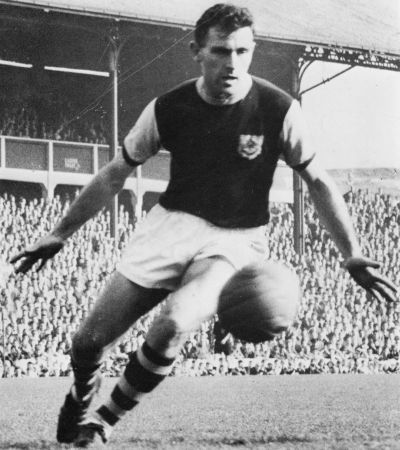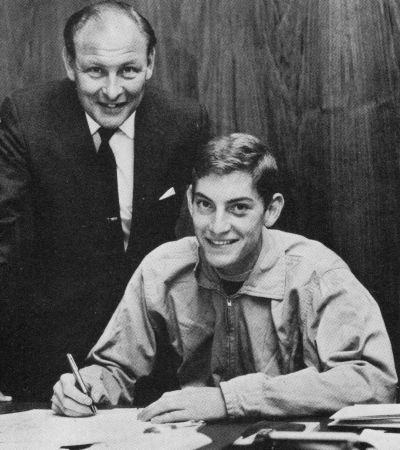It had brightened the mood but the fans were still not convinced of Adamson. He didn't help himself either. He always came across as aloof and was a sitting target when things didn't go well. Fans had also been incensed by the comments of chairman Bob Lord during the darkest days of Easter when he said: "The current situation could mean a stay in the second division for a few seasons."
 |
| John Angus in his pomp, here playing against Blackburn at Ewood |
Back in 1972, football didn't get the wall to wall coverage it gets today. Both the national and local press led with cricket during the summer months and as the players were counting down the days to a return for pre-season training the only news to come out of Turf Moor was that of those leaving the club.
Adamson had released young players Duncan McMahon and Harry Falconer. All other players out of contract had been retained and so not many changes were predicted. However, two pieces of news during the summer, as expected as they were, brought sadness for those with a keen interest in all things claret and blue as two greats, and I don't use the word great lightly, left the club.
Following relegation a year earlier, we'd started the season with a 2-2 draw at Cardiff and a 2-1 home victory against Luton. John Angus played in those two games but was ruled out for the remainder of the season with a serious ankle injury and the inevitable, but sad, news came that he'd been forced to call it a day.
Keith McNee, who was about to leave the Burnley Express for the newly created Radio Blackburn, said that whenever a Turf Moor history is written the name of John Angus should be written in gold letters.
McNee, like so many Burnley supporters, had revelled in the performances of Angus and the tributes for this great right back poured in from his former team mates, and they were so genuine.
Tommy Cummings, who so often lined up alongside him in defence, said of him: "Angus was a fantastic footballer, better even than the fans realised.
"He was great to play alongside, he made it look simple because he had ability and was rarely ruffled, and the skill he had was quite astonishing. A truly magnificent player, who made a big contribution to our championship success, and many other triumphs around that period."
"John Angus was not a fast full back," said Adam Blacklaw. "But, my word, he was hard. Not so many wingers got the better of him and he was dedicated to football. I enjoyed being in the same team. We all did. What a player, but what a quiet lad."
He was known as Cool John Angus to the Burnley fans. John Connelly said: "John was one of the coolest players I have seen on a football pitch. So calm and solid, it was a joy to have him pushing the passes through. He was an expert at slowing the tempo.
"A weakness? Well, John would admit he wasn't the fastest football in the world but then again, as I found, when you pushed the ball past him you had to make a kind of detour to get round him. He was clever at stopping his man, a gifted full back with a load of skill and an asset to the team at Turf Moor.
"Off the field, John was very quiet but we all liked him."
Angus had been a big favourite of mine. Like the rest of the fans, with almost a year out of the team, I'd sort of got used to him not being there, but this was undoubtedly a sad day as the last of the championship team finally bowed out as a player at Turf Moor.
Cool John Angus had played over 520 games for our club. How on earth do you go about replacing that sort of quality and that sort of loyalty and experience?
The reporting of John's retirement was probably the last major task for McNee at the Burnley Express, and his successor Peter Higgs walked into an even bigger story on his first day in the job.
He'd just settled into his seat in the offices at Bull Street, having made the long walk from his temporary digs at the Big Window, when a fax arrived from Burnley Football Club confirming the departure of general manager Mr Harry Potts.
 |
| Five years earlier as Harry Potts oversees the signing of Martin Dobson |
It was brief, there was no detail, so the young reporter did what he should and contacted chairman Lord to put some meat on the bone. His first encounter with Lord left a lasting impression. The chairman told him, and in no uncertain terms, that when the club issued a press release that was it, there was no further information, and that he should not contact the club expecting any. He was told that he'd have to learn quickly if he wished to have a career reporting on Burnley FC.
Potts gone. This one hit me hard. I thought the world of him. Harry was a gentleman who had managed our club through one of the most wonderful periods in its history. A year and a half earlier he'd been ditched as manager immediately after a 5-0 win against Nottingham Forest and moved into a general manager role.
In truth, he'd lost the battle with Adamson who had taken his job and pushed him out. That was a sad day, I always felt, for Burnley Football Club, and so was this as Harry cleared his desk and departed.
It was described as an amicable agreement and Potts, speaking of his time at Burnley, said: "I've enjoyed every minute of it."
Burnley Football Club with no John Angus or Harry Potts - things were changing ahead of pre-season with news that Burnley's season would get underway with a home game against Carlisle United and then a trip to Fulham.
The players were due back for pre-season training and before that Carlisle game we had a couple of friendlies to play in South Wales against Swansea and Newport and also the Watney Cup, the competition for the league's highest scorers from the previous season. We'd been drawn away to Lincoln City in the quarter final.
